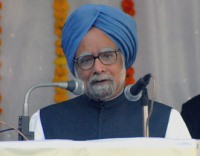India opens new reprocessing plant
07 January 2011
Nuclear scientists and engineers were called 'nation builders' by prime minister Manmohan Singh as he inaugurated India's latest reprocessing plant.
 |
Singh opens the Power Reactor Fuel
Reprocessing Plant-2 |
The facility at Tarapur will break down highly radioactive used nuclear fuel to extract uranium and plutonium for reuse in fast neutron reactors.
"We have come a long way since the first reprocessing of spent fuel in India in 1964 at Trombay," said Singh at yesterday's ceremony, "The recycling and optimal utilization of uranium is essential to meet our current and future energy security needs."
He went on to congratulate all those "who have played a role in this important landmark and who have contributed to the development of our capabilities in atomic energy. In their own way, each one of our scientists and engineers engaged in this very important national project are nation builders."
There are already several reprocessing plants in India - all operated by the Bhabha Atomic Research Centre - at Tarapur, Trombay and Kalpakkam. Small plants at each site were supplemented in 1998 by a new one of 100 tonnes per year at Kalpakkam, and this is now being extended to so that it may handle carbide fuel from the Fast Breeder Test Reactor.
The new plant inaugurated yesterday at Tarapur also has a capacity of 100 tonnes per year, and another entirely new facility is under construction at Kalpakkam.
Experts at the International Atomic Energy Agency told World Nuclear News that this second reprocessing plant at Tarapur is not among the facilities covered by the early 'type 66' safeguards agreement or the more comprehensive India-specific safeguards regime agreed last year.
India's long-term nuclear power plans have been for a three-stage program which should enable it to eventually utilise its large reserves of thorium as reactor fuel. Besides importing technology and fuel from abroad, the country is still dedicated to using natural uranium in heavy-water reactors followed by plutonium-fuelled fast neutron reactors that would breed the thorium isotopes required for an ultimate fleet of advanced heavy water reactors. Key to all this is advanced capabilities in reprocessing used nuclear fuels to separate true wastes from materials that will be fuels for other reactors.
Researched and written
by World Nulcear News